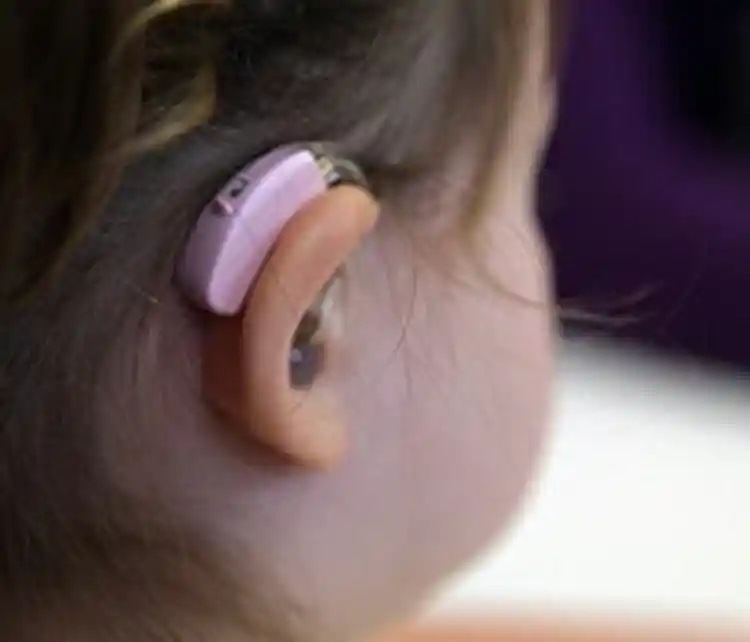Childhood Hearing Loss

Hide Video Transcript
Video Transcript
ELLA MUSE
[INAUDIBLE] NARRATOR
Listen closely. One of these girls was born profoundly deaf.
She's the one carrying the conversation.
SPEAKER 1:[SINGING] One little seashell--
NARRATOR
Three-year-old Ella Muse failed her newborn hearing screening in the hospital. A few weeks later, she had a hearing re-screen with a pediatric audiologist.
CARIANNE MUSE: At three and a half months, we knew that Ella had profound hearing loss, and the next step was hearing aids.
Is your ear working?
ELLA MUSE
No. CARIANNE MUSE
Let me check this one. It is working.
NARRATOR
Ella then started in the Early Intervention Program at the Atlanta Speech School. CARIANNE MUSE
It's been a miracle. ELLA MUSE
Horse. CARIANNE MUSE
It's been incredible to watch, and every now and then it still catches me off guard that she was ever a profoundly deaf child. NARRATOR
Ella's success story comes out of the 1-3-6 Program LINDA LASKER
1-3-6 is that all children, from birth, should be screened for hearing loss by one month of age. PRADEEP SINHA
And it's because of otoacoustic emissions that we're able to screen newborns in a quick, cost-efficient and time-efficient manner so we can really meet that goal of universal infant screening. SPEAKER 2
We're going to do the visual reinforcement audiology next. NARRATOR
Newborns who fail the screening should have an audiology exam by three months of age. PRADEEP SINHA: Most pediatricians do have proper screening equipment.
And again, I want to underscore the word screening.
Because really to get properly tested, you need to go to an audiologist.
And generally they're found either in private practice or in practice with an ENT physician.
NARRATOR
If hearing loss is detected, the child should be referred for intervention before six months of age. PRADEEP SINHA
The premise behind this was to most children did not get diagnosed till they were about three years of age. A lot of these children were unable to catch up academically, emotionally, socially with their peers.
LINDA LASKER
So the urgency of doing the 1-3-6 as close as to birth as we can to get that child in an intervention program is essential-- essential. Ahhh, good listening.
Yay! Did you hear it? I am helping the parents put in language into what we call receptive language-- how they know that that word means something.
[? Sloane, ?] did you say you wanted a turn?
[? SLOANE
?] I want a turn. LINDA LASKER
OK, can you ask me nicely? [? SLOANE
?] I want a turn. LINDA LASKER
In the toddler program, it's pulling it out of the child. They already know the words, a lot of the words.
They know the language, but we're trying to get the children to speak.
[? SLOANE
Doggy. ?] LINDA LASKER
You got a doggy? Can you show your friends?
NARRATOR
Even with universal newborn hearing screening, some children, like Colin Giles, are missed. SPEAKER 3
Ss-slot. SCARLETT GILES
Colin failed his newborn hearing screening, and then we went back two weeks later to get tested, and he passed. NARRATOR
As he grew older-- SCARLETT GILES
He talked on time, but we did notice that his speech-- a lot of people had trouble understanding him. COLIN GILES
Amelia, what color is this? AMELIA GILES
White. COLIN GILES
White, good job. NARRATOR
When his sister Amelia was born, she failed her newborn hearing screening and was diagnosed with moderate to severe hearing loss. Since it was genetic, Colin was retested at age four and found to have mild to moderate hearing loss.
SCARLETT GILES
It was harder for us to take that Colin had hearing loss because we caught him late. COLIN GILES
Escape to the skyscraper. SCARLETT GILES
Now he is getting speech therapy through his local school. PRADEEP SINHA
Hearing loss is one of the key things everybody should check for if there's any sort of learning or speech disability and even behavioral disabilities or behavioral problems, believe it or not. LINDA LASKER
Whenever there's a hearing loss, you must treat it. NARRATOR: With aggressive treatment, after three short years, Ella Muse is being mainstreamed into a regular classroom.
CARIANNE MUSE
Now being identified at birth, getting into intervention so early, is really changing what a deaf child looks like.